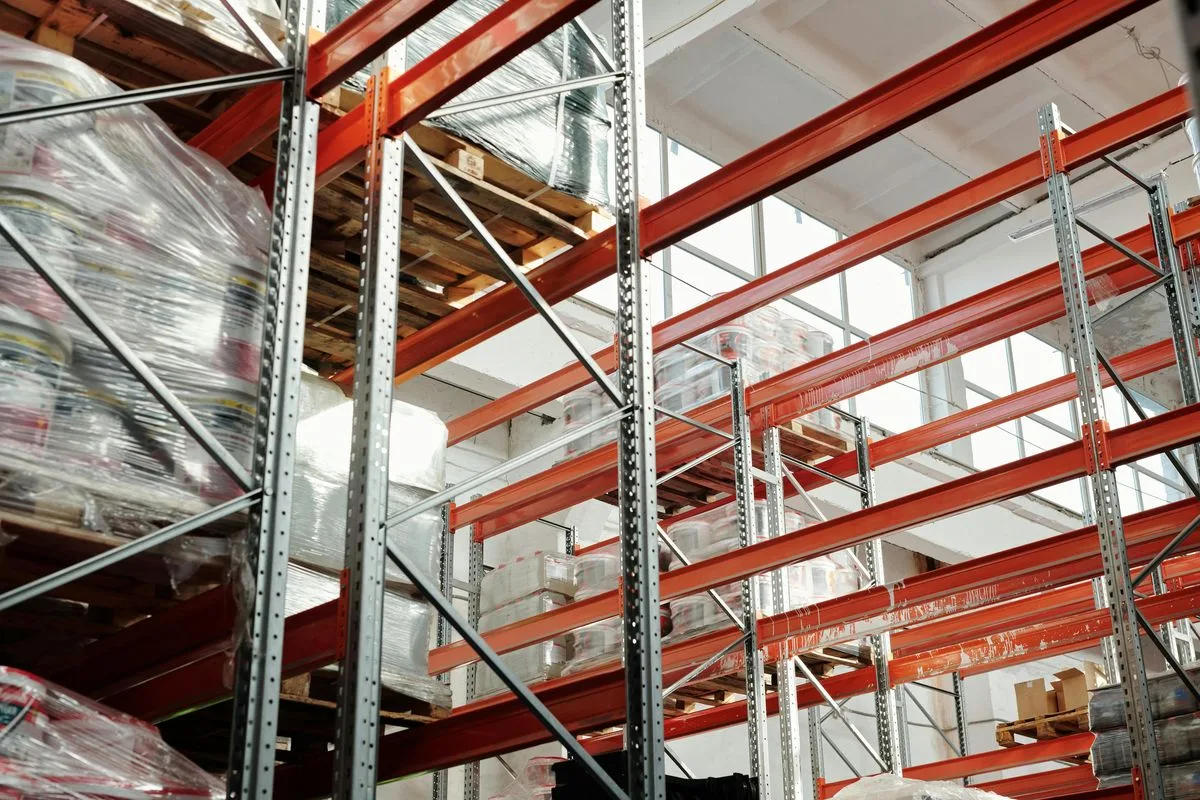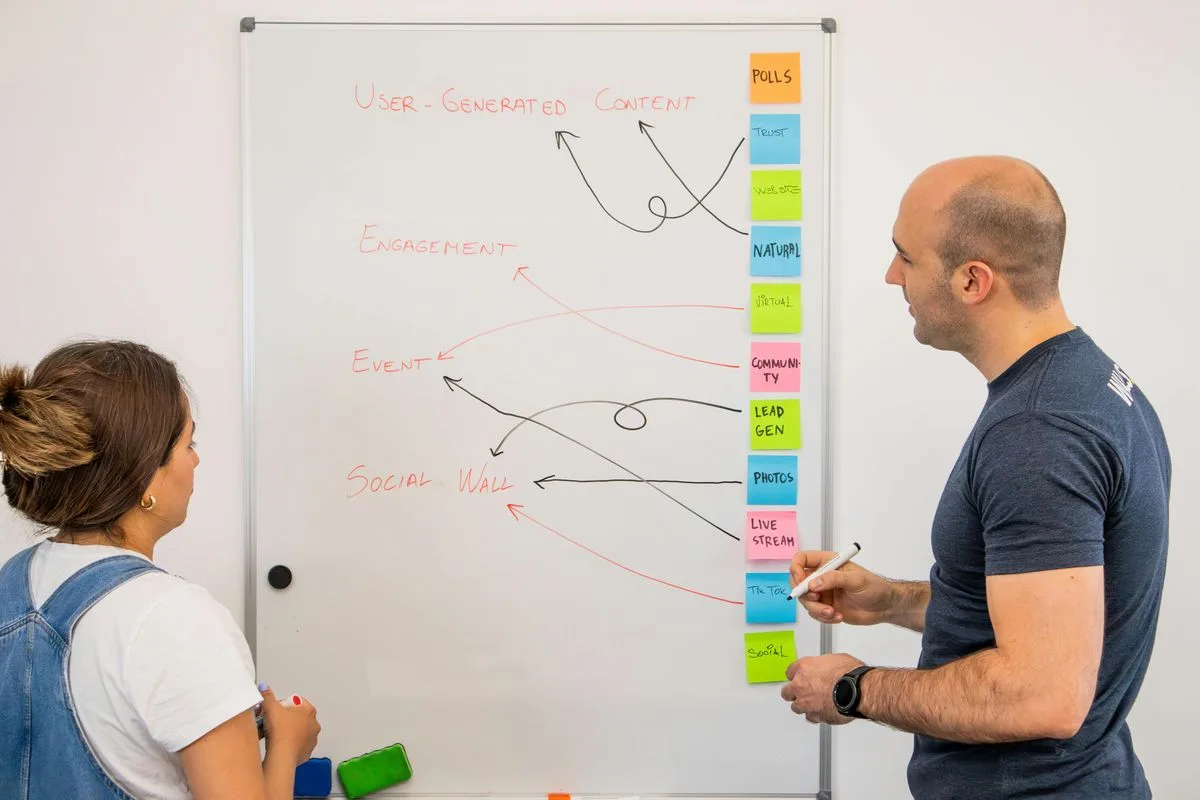Growleady Team
Lead Generation Experts
Top B2B Products: From Equipment to Professional Services
Uncover B2B markets, from manufacturing equipment to professional services. See key sectors and learn how understanding client needs drives success.

The B2B marketplace is a bustling arena where companies trade with one another, and it's fascinating to see what's up for grabs. From raw materials to cutting-edge tech, the B2B world is a treasure trove of products that keep industries humming.
You might be surprised by the sheer variety of goods exchanged in these markets. Whether you're a budding entrepreneur or just curious about the inner workings of business, understanding B2B products can give you valuable insights.
Ready to jump into the world of corporate commerce? Let's explore the types of products that make B2B markets tick and why they're essential for businesses big and small.
Understanding B2B Markets and Their Products
B2B markets are like a giant marketplace where businesses trade with each other. Instead of selling to individual consumers, companies in B2B markets sell products and services to other businesses. These products fall into three main categories:
Entering Goods and Services
Entering goods and services are the building blocks of other products. They're the raw materials and components that businesses use to create their own offerings. For example:
Lumber for construction companies
Metallic ores for manufacturers
Electronic components like integrated circuits for tech companies
Think of these as the ingredients in a recipe. Just as you need flour, sugar, and eggs to bake a cake, businesses need these entering goods to create their products.
Foundation Goods and Services
Foundation goods and services are the tools and equipment businesses use to make their products. They include:
Office buildings
Machine tools
Specialized scanning equipment
These are like the kitchen appliances you use to bake that cake. You need an oven, mixing bowls, and baking pans to turn those ingredients into a delicious dessert.
Facilitating Goods and Services

Facilitating goods and services helps businesses run smoothly and achieve their goals. They include:
Market research services
Cleaning supplies
Copiers
Maintenance, repair, and operating supplies (MRO)
These are the extras that make your baking experience easier and more efficient, like oven mitts, recipe books, or a kitchen timer.
Understanding these categories helps you navigate the B2B marketplace more effectively. When reaching out to potential leads via cold email or LinkedIn, tailor your approach based on the type of product you're offering.
For example, if you're selling raw materials, focus on how your product can improve the quality of your prospect's end product. If you're offering facilitating services, emphasize how you can streamline their operations or boost productivity.
Remember, B2B buying decisions often involve multiple stakeholders and longer sales cycles compared to B2C markets. Be prepared to provide detailed information about your products and their benefits to the business as a whole. And don't forget to highlight how your offering fits into their specific industry or production process.
By understanding the types of products in B2B markets, you'll be better equipped to identify potential customers, craft compelling pitches, and eventually close more deals in this complex but rewarding marketplace.
Raw Materials and Natural Resources
Raw materials and natural resources form the foundation of many B2B transactions. These products are essential inputs for various industries, serving as the building blocks for manufacturing processes and production lines.
Industrial Chemicals
Industrial chemicals play a crucial role in B2B markets, serving as key components in countless manufacturing processes. These chemicals include processed materials such as specialty chemicals, leathers, and metals. When reaching out to potential leads in this sector, it's important to understand the specific applications of these chemicals in their industry.
For example, a company producing adhesives might be interested in bulk purchases of solvents or resins. When crafting your cold email or LinkedIn outreach, focus on how your chemical products can improve their production efficiency or product quality. Highlight any unique properties or certifications your chemicals possess, as these can be significant selling points in B2B transactions.
Remember, safety and regulatory compliance are top priorities in the chemical industry. Include information about your products' safety data sheets and any relevant certifications in your outreach. This demonstrates your commitment to quality and compliance, which can set you apart from competitors.
Agricultural Commodities
Agricultural commodities are another significant category in B2B raw materials trading. These include products like wheat, fruit, and vegetables. When targeting potential leads in this sector, it's crucial to understand the seasonal nature of these commodities and the specific needs of different buyers.
For instance, a food processing company might be looking for large quantities of specific fruits or vegetables for their product lines. In your outreach, emphasize factors such as the quality, consistency, and reliability of your supply. If you offer organic or sustainably sourced produce, make sure to highlight this, as it can be a significant selling point for many buyers.
Consider the timing of your outreach as well. Many agricultural buyers plan their purchases well in advance, aligning with growing seasons and production schedules. Tailor your approach to match these cycles, offering information about upcoming harvests or new crop varieties that might interest them.
In both industrial chemicals and agricultural commodities, building long-term relationships is key. Use your outreach to showcase not just your products but also your expertise in the field. Offer insights into market trends or innovative uses for your products. This approach positions you as a valuable partner rather than just another supplier, increasing your chances of success in the B2B marketplace.
Manufacturing Equipment and Machinery
Manufacturing equipment and machinery form the backbone of B2B markets, enabling businesses to produce goods efficiently and at scale. These products are essential for various industries, from textile manufacturing to food processing.
Industrial Machinery
Industrial machinery encompasses a wide range of specialized equipment designed for specific manufacturing processes. Textile machinery, printing machinery, and food processing machinery are prime examples of industrial machinery traded in B2B markets.
When reaching out to potential leads for industrial machinery, focus on the unique features and benefits of your products. For instance, if you're selling textile machinery, highlight how it improves production efficiency or reduces waste. Remember, decision-makers in these industries are often looking for solutions that can give them a competitive edge.
To improve your outreach, consider these tips:
Research your prospect's current manufacturing processes
Tailor your pitch to address specific pain points or inefficiencies
Provide case studies or testimonials from similar businesses in their industry
Offer a demo or trial period to showcase the machinery's capabilities
Production Line Equipment
Production line equipment includes essential components that keep manufacturing operations running smoothly. Conveyor belts, packaging machinery, and assembly line tools are crucial for businesses looking to streamline their production processes.
When approaching leads for production line equipment, it's important to understand their specific needs and challenges. Here's how you can make your outreach more effective:
Analyze the prospect's current production setup
Identify bottlenecks or areas for improvement
Propose solutions that address these specific issues
Emphasize the potential return on investment (ROI) of your equipment
For example, if you're selling packaging machinery, you might highlight how it can increase packaging speed, reduce material waste, or improve product protection during shipping. These tangible benefits can help decision-makers justify the investment to their stakeholders.
Remember, in B2B sales of manufacturing equipment and machinery, building long-term relationships is key. Position yourself as a valuable partner by offering expertise and insights beyond just selling a product. Share industry trends, best practices, and innovative solutions to help your prospects stay ahead of the curve.
By focusing on the specific needs of each prospect and demonstrating how your manufacturing equipment or machinery can solve their unique challenges, you'll be more likely to convert leads into long-term customers in the B2B market.
Technology and Software Solutions
In the B2B marketplace, technology and software solutions are crucial products that drive business efficiency and growth. These digital tools empower companies to streamline operations, enhance productivity, and stay competitive in the modern business world.
Enterprise Software
Enterprise software forms the backbone of many B2B transactions. It's designed to manage complex business processes across various departments. Examples include:
Enterprise Resource Planning (ERP) solutions
Human Resources Management Software (HRMS)
Supply Chain Management (SCM) platforms
When reaching out to potential leads for enterprise software, focus on the specific pain points your solution addresses. For instance, if you're selling a CRM system, highlight how it can improve customer retention rates or increase sales efficiency. Use case studies and ROI calculators to demonstrate the tangible benefits of your software.
Remember, decision-makers in B2B are often looking for long-term solutions. Emphasize the scalability and customization options of your enterprise software. Offer free trials or demos to let prospects experience the software's capabilities firsthand.
Networking and Telecommunications Systems

Networking and telecommunications systems are essential for businesses to maintain seamless communication and data transfer. These products include:
Routers and switches
VoIP systems
Data center equipment
Network security solutions
Cloud-based communication platforms
When approaching leads for networking solutions, focus on how your products can enhance connectivity, improve data security, and reduce communication costs. For example, if you're selling a cloud-based communication platform, highlight its ability to support remote work and help global collaboration.
To stand out in this competitive market, offer comprehensive support services along with your products. Provide network assessments to identify potential vulnerabilities or inefficiencies in a prospect's current setup. This approach not only showcases your expertise but also helps build trust with potential clients.
Consider creating industry-specific pitches. For instance, a healthcare provider might be more interested in HIPAA-compliant communication solutions, while a financial institution might prioritize robust security features. Tailor your outreach messages to address these specific needs and regulations.
Finally, don't forget to discuss the future-proofing aspect of your networking solutions. With technology evolving rapidly, businesses want assurance that their investments will remain relevant in the coming years. Highlight how your products can adapt to emerging technologies like 5G or AI-driven network management.
Office Supplies and Furniture
Office supplies and furniture form a significant segment of B2B markets. These products are essential for daily operations and for creating functional workspaces. Here's what you need to know about this category:
Essential Office Supplies
Office supplies encompass a wide range of products:
Writing instruments: Pens, pencils, markers
Paper products: Notepads, printer paper, sticky notes
Organizational tools: Folders, binders, filing cabinets
Technology accessories: USB drives, mouse pads, laptop stands
When pitching these products, focus on quality, durability, and cost-effectiveness. Highlight how bulk purchases can lead to significant savings for businesses.
Ergonomic Furniture Solutions
Modern offices prioritize employee comfort and productivity. Ergonomic furniture is a key selling point:
Adjustable chairs with lumbar support
Standing desks and desk converters
Monitor arms and keyboard trays
Footrests and anti-fatigue mats
Emphasize the health benefits and potential productivity gains from ergonomic solutions. Offer complimentary workspace assessments to demonstrate your expertise and build trust.
Customization and Branding Opportunities
Many businesses seek to reinforce their brand identity through office supplies and furniture:
Custom-printed stationery and business cards
Branded promotional items like pens and notepads
Furniture in company colors or with logo integration
Showcase your ability to provide personalized solutions that align with your client's brand image. Offer design services or collaborate with local print shops to provide a comprehensive branding package.
Sustainable and Eco-Friendly Options
With growing environmental awareness, eco-friendly office products are in high demand:
Recycled paper products
Refillable pens and markers
Energy-efficient lighting solutions
Furniture made from sustainable materials
Highlight the environmental benefits and potential cost savings of sustainable options. Consider partnering with eco-certified suppliers to enhance your credibility in this area.
Tech-Integrated Furniture
As technology evolves, so does office furniture:
Desks with built-in charging stations
Conference tables with integrated video conferencing systems
Sound-absorbing phone booths for open-plan offices
Smart lockers for secure storage
Demonstrate how these innovative solutions can streamline workflows and enhance productivity. Offer installation and setup services to provide added value to your clients.
By understanding the diverse needs of businesses in terms of office supplies and furniture, you can tailor your approach to each client. Focus on solutions that improve efficiency, comfort, and brand image while keeping an eye on sustainability and technological integration.
Professional Services
Professional services form a significant segment of B2B markets, offering specialized expertise and solutions to businesses across various industries. These services are essential for companies looking to improve their operations, navigate complex challenges, and gain a competitive edge.
Consulting Services
Consulting services are a cornerstone of B2B professional services. Companies like Deloitte, Accenture, and McKinsey provide strategic guidance to businesses on management, operations, and finance. These firms offer:
Strategic planning and implementation
Operational efficiency assessments
Financial restructuring advice
Digital transformation strategies
Risk management solutions
When reaching out to potential clients for consulting services, focus on their specific pain points. For example, if a company struggles with digital adoption, highlight your expertise in digital transformation. Use LinkedIn to connect with decision-makers and share case studies demonstrating successful outcomes for similar businesses.
Marketing and Advertising Services
Marketing and advertising services are crucial for businesses looking to enhance their brand presence and reach their target audience effectively. Key players in this space include:
Digital marketing platforms: Salesforce, HubSpot, and Mailchimp
Advertising agencies: WPP, Omnicom, and Publicis Groupe
Market research firms: Nielsen, Ipsos, and Kantar
These services encompass:
Email marketing campaigns
Customer relationship management (CRM) solutions
Content management systems
Social media marketing strategies
Brand development and positioning
When approaching potential clients for marketing services, tailor your pitch to their industry and company size. For instance, a small e-commerce business might benefit from email marketing tools, while a large corporation may need a comprehensive CRM system.
Utilizing Growleady’s lead generation services can help you identify and connect with the right clients effectively. Use cold emails to showcase your understanding of their market and how your services can drive growth.
Remember, in B2B professional services, building relationships is key. Whether you're offering consulting or marketing services, focus on demonstrating value and expertise rather than hard selling. Share industry insights, offer free consultations, or provide valuable content to establish trust and credibility with potential clients.
Wholesale Goods for Retail
In the B2B market, wholesale goods for retail form a significant category of products traded between businesses. These items are typically purchased in bulk by retailers and then sold to end consumers. Here's what you need to know about this sector:
Types of Wholesale Goods
Wholesale goods for retail encompass a wide range of products:
Apparel and accessories
Electronics and gadgets
Home goods and decor
Food and beverages
Beauty and personal care items
Toys and games
Each of these categories requires different approaches in terms of sourcing, pricing, and marketing strategies.
Bulk Purchasing and Pricing
When dealing with wholesale goods, volume is key. Retailers often benefit from:
Tiered pricing structures
Minimum order quantities (MOQs)
Seasonal discounts
Long-term contract pricing
Understanding these pricing models helps you negotiate better deals and maximize your profit margins.
Quality Control and Compliance
In wholesale transactions, quality control is crucial. You're responsible for:
Inspecting goods upon receipt
Ensuring products meet industry standards
Complying with relevant regulations (e.g., safety standards for toys)
Establishing a robust quality control process protects your business reputation and customer satisfaction.
Inventory Management
Effective inventory management is essential when dealing with wholesale goods. Consider:
Just-in-time (JIT) inventory systems
Demand forecasting techniques
Warehouse management solutions
Stock rotation strategies
These practices help minimize carrying costs and reduce the risk of obsolete inventory.
Building Supplier Relationships
Strong relationships with wholesale suppliers can lead to:
Better pricing
Priority on new or in-demand products
Flexible payment terms
Exclusive distribution rights
Invest time in nurturing these relationships to gain a competitive edge in the retail market.
Adapting to Market Trends
The wholesale goods sector is constantly evolving. Stay ahead by:
Monitoring consumer preferences
Keeping an eye on emerging brands
Attending trade shows and industry events
Analyzing sales data to identify trends
Being adaptable and responsive to market changes ensures your retail offerings remain relevant and profitable.
By understanding these key aspects of wholesale goods for retail, you'll be better equipped to navigate this dynamic sector of the B2B market. Remember, success in this area often comes down to a combination of smart purchasing decisions, efficient operations, and a keen eye for market trends.
Industrial Components and Parts
In the B2B marketplace, industrial components and parts form a crucial sector, serving as the building blocks for countless manufacturing and production processes. This category encompasses a wide range of products essential for businesses across various industries.
Raw Materials: The Foundation of Production
Raw materials are the lifeblood of many industries. These include:
Concrete: Used in construction and infrastructure projects
Steel: Essential for manufacturing, construction, and automotive industries
Building materials: Lumber, glass, and insulation for construction projects
Machinery and Equipment: Powering Production Lines
Manufacturing processes rely heavily on specialized machinery and equipment:
CNC machines: For precision cutting and shaping of materials
Assembly line robots: Automating production processes
Industrial ovens and furnaces: For heat treatment and processing
Electronic Components: The Brain of Modern Technology
Electronic components are essential in today's tech-driven world:
Semiconductors: Powering everything from smartphones to industrial control systems
Microchips: The core of computing devices and smart appliances
Circuit boards: Found in virtually all electronic devices
Automotive Parts: Keeping the Wheels Turning
The automotive industry thrives on a vast network of parts suppliers:
Tires: From passenger vehicles to heavy-duty trucks
Batteries: Powering both traditional and electric vehicles
Electronics: Navigation systems, entertainment units, and engine control modules
When reaching out to potential clients in the industrial components sector, focus on their specific needs and pain points. For example, if targeting a car manufacturer, highlight your expertise in automotive electronics or battery technology. Tailor your cold email or LinkedIn message to address their unique challenges, such as supply chain efficiency or quality control.
Remember, in B2B sales of industrial components, reliability and quality are paramount. Emphasize your company's track record, certifications, and quality assurance processes in your outreach efforts.
By demonstrating your understanding of their industry and specific requirements, you'll increase your chances of securing valuable leads and building long-lasting business relationships.
Conclusion
B2B markets are diverse and complex, encompassing a wide range of products and services. From manufacturing equipment to professional services and industrial components, these markets drive global commerce.
Success in B2B transactions hinges on understanding your client's unique needs, delivering quality products, and fostering strong relationships. As technology evolves and industries advance, B2B markets continue to adapt, offering innovative solutions to meet the ever-changing demands of businesses worldwide.
By staying informed about the various types of products and services in B2B markets, you'll be better equipped to navigate this dynamic world and seize opportunities for growth and collaboration.
Frequently Asked Questions
What are the main sectors in B2B markets?
The main sectors in B2B markets include Manufacturing Equipment, Office Supplies, Wholesale Goods for Retail, Professional Services, and Industrial Components and Parts. These sectors cover a wide range of products and services, from machinery and office equipment to consulting and raw materials.
Why is quality important in B2B transactions?
Quality is crucial in B2B transactions because it directly impacts the efficiency and reliability of business operations. High-quality products and services lead to increased productivity, reduced downtime, and improved customer satisfaction. This, in turn, helps businesses maintain their reputation and competitive edge in the market.
How does technology integration affect B2B markets?
Technology integration in B2B markets enhances efficiency, streamlines processes, and improves communication between businesses. It enables better inventory management, faster order processing, and real-time data analysis. This leads to cost savings, improved decision-making, and increased competitiveness in the marketplace.
Why is understanding client needs important in the Industrial Components sector?
Understanding client needs in the Industrial Components sector is crucial because it allows suppliers to provide tailored solutions. This ensures that businesses receive the exact components or parts they require, leading to improved efficiency, reduced waste, and stronger business relationships. It also helps in developing innovative products that address specific industry challenges.
How can businesses effectively communicate in B2B relationships?
Effective communication in B2B relationships involves clear, concise, and professional interactions. Businesses should focus on providing detailed product information, responsive customer service, and regular updates on orders or services. Utilizing various communication channels, such as email, phone, and video conferencing, can help maintain strong connections with clients and partners.


